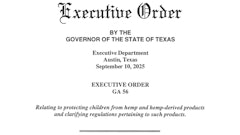PRESS RELEASE - Among the bills Gov. Doug Ducey signed this weekend in Arizona is S1494 (marijuana; testing; advisory council; library), which will allow MMJ patients to renew their state-issued cards every two years, instead of annually. The unique partnership of republicans and democrats who came together to improve the AMMA Act, by including safety testing and lowering card costs, essentially keeps $30 million in the hands of patients rather than the government, that for close to ten years, has just been building a slush fund without good use. It also mandates testing for marijuana products which puts Arizona in line with the rest of the states' MMJ programs.
The goal of lowering card costs set by MITAAz as a legislative priority for the organization two years ago to work with the Arizona legislature to lower patient card costs is taking a massive step in the right direction. As the law previously read, patients were required to pay a $150 annual fee to the Department of Health Services on top of charges paid to their medical marijuana doctor. Ducey signing S1494 means that the $150 fee would go twice as far. MITAAz helped navigate the complex legislative waters to achieve the goal of including lowering card costs with the inevitable testing legislation.
As of the most recent report in April, DHS lists 197,025 qualifying patients in the state. Each patient is required to pay $150 every year, which totals more than $29.5 million. It costs roughly $18 million to run the program in Arizona. Former DHS director Will Humble told 12 News in 2017 that setting the card fee at $150 was a mistake. “In the end, we have far more patients than I anticipated and therefore more revenue,” Humble said. Legislative attempts have been made by both Republicans and Democrats to lower the unnecessary government fees in the past but to no avail. This marks the first real reform of the AMMA Act since 2010 passing--an extraordinary accomplishment considering our partisan divide.
But the crux of the bill, and the reason it passed, was that it requires dispensaries test their marijuana for harmful toxins like pesticides. Lawmakers have attempted to force testing in past sessions, to no avail, but this time the measure passed unanimously in both chambers. The bill also sets up a 12-member committee made up of representatives from dispensary owners, a cannabis testing association, a cannabis trade group, cultivators and those who manufacture edibles, a patient, a designated caregiver, a health-care provider who specializes in drug treatment disorders, and a representative of the Department of Public Safety, all appointed by the DHS director.

























